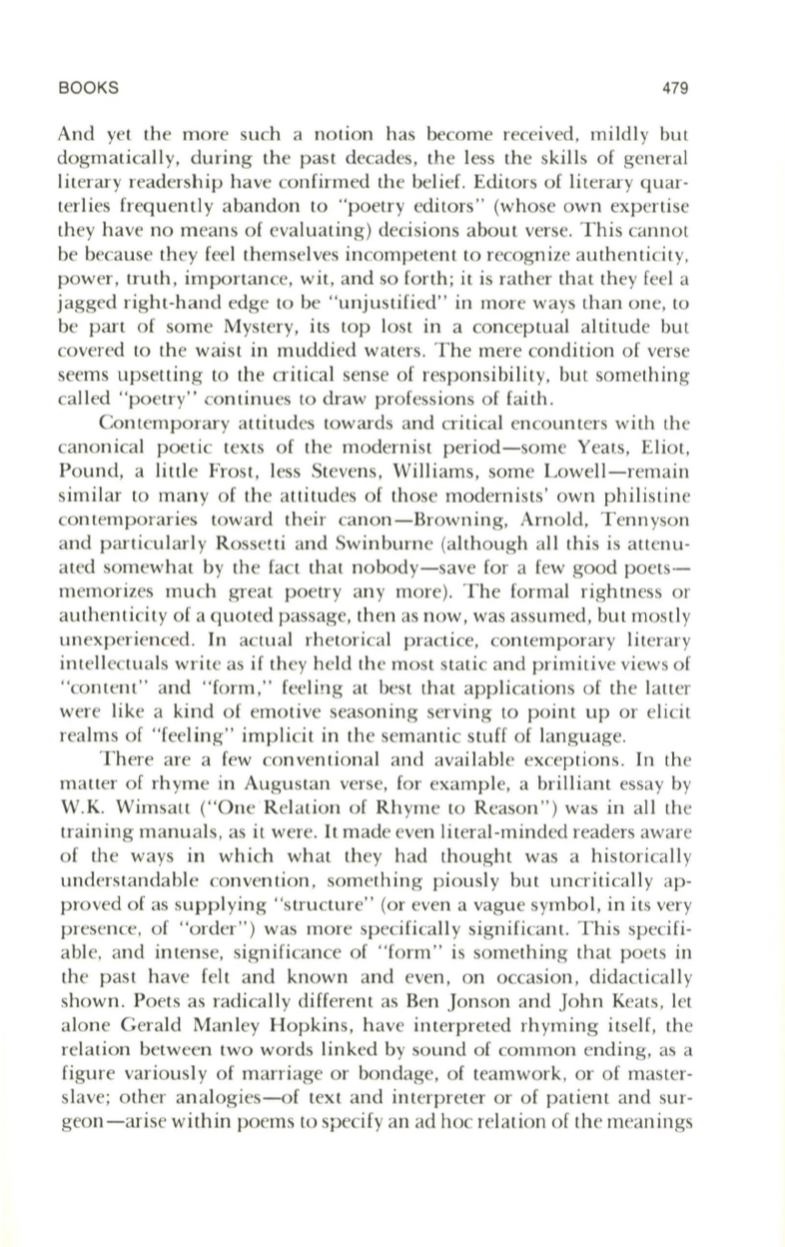
BOOKS
479
And yet the more such a notion has become received, mildly but
dogmatically, during the past decades, the less the ski lls of general
literary readership have confirmed the belief. Editors of literary quar–
ter lies frequently abandon to "poetry editors" (whose own expertise
they have no means of evaluating) decisions about verse. This cannot
be because they feel themselves incompetent to recognize authenticity,
power, truth, importance, wit, and so forth; it is ra ther that they feel a
jagged right-hand edge to be "unjustified" in more ways than one,
to
be part of some Mystery, its top lost in a conceptual altitude but
covered to the waist in muddied waters. The mere condition of verse
seems upsetting to the critical sense of responsibility, but something
call ed "poetry" continues
to
draw professions of faith .
Contemporary attitudes towards and critical encounters with the
canonical poeti c texts of the moderni st period-some Yeats, Eliot,
Pound, a littl e Frost, less Stevens, Williams, some Lowell-remain
similar to many of the attitudes of those modernists' own philistine
contemporari es toward their canon-Browning, Arnold, Tennyson
and particularly Rossetti and Swinburne (although all this is attenu–
ated somewhat by the fact that nobody- save for a few good poets–
memorizes mu ch great poetry any more). The formal rightness or
authenticity of a quoted passage, then as now, was assumed, but mostl y
unexperienced . In actual rhetorical practice, contemporary literary
intellectuals write as if they held the most static and primitive views of
"con tent" and "form ," feeling at bes t that applications of the latter
were like a kind of emotive seasoning serving to point up or elicit
realms of "feeling" implicit in the semantic stuff of language.
There are a few conventional and available excep tions . In the
matter of rhyme in Augustan verse, for example, a brilliant essay by
W.K. Wimsatt ("One Relation of Rh yme to Reason ") was in all the
training manuals, as it were.
It
made even literal-minded readers aware
of the ways in which what they had thought was a historica ll y
understandable convention, something piously but uncritically ap–
proved of as supplying "structure" (or even a vague symbol, in its very
presence, of "order ") was more specifically significant. This specifi–
able, and intense, significance of " form " is something tha t poets in
the past have felt and known and even, on occasion, didacticall y
shown. Poets as radically different as Ben Jonson and John Keats , let
alone Gerald Manley Hopkins, have interpreted rhyming itself, the
relation between two words linked by sound of common ending, as a
figure variousl y of marriage or bondage, of teamwork, or of master–
slave; other analogies-of text and interpreter or of patient and sur–
geon-arise within poems
to
specify an ad hoc relation of the meanings


